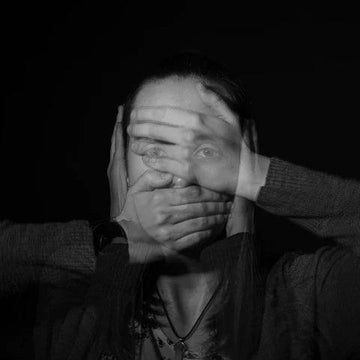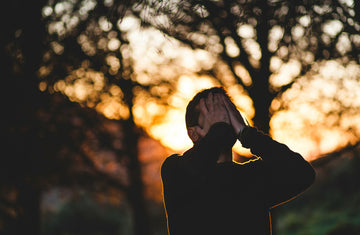As I’m sure you know, anxiety sucks. It can derail your entire day. It can feel like it controls you. And you may not want to turn to prescription drugs as a solution. So let’s talk about how to reduce anxiety naturally.
Why Anxiety Is Bad for Your Health
Anxiety can have many downsides to your health, both physical and mental. Below are some reasons why anxiety is bad for you…
Chronic stress
Anxiety triggers the body’s stress response, leading to the release of stress hormones like cortisol and adrenaline. Prolonged activation of this stress response can result in chronic stress, which can contribute to several health problems. Like high blood pressure, weakened immune system, and increased risk of cardiovascular diseases.
Weakened immune system
Anxiety and chronic stress can suppress the immune system, making you more susceptible to infections, illnesses, and slower recovery times. This can leave you vulnerable to many health conditions and make it harder for your body to fight off infections.
Sleep disturbances
Anxiety often interferes with sleep, causing difficulties falling asleep, staying asleep, or experiencing restful sleep. Sleep is essential for overall health and well-being, and chronic sleep disturbances can lead to fatigue, impaired cognitive function, mood disturbances, and decreased immune function.
Mental health disorders
Anxiety disorders can significantly impact mental health. They may contribute to the development or exacerbation of other mental health conditions like depression, obsessive-compulsive disorder (OCD), and substance abuse disorders.
The presence of multiple mental health disorders can further complicate treatment and overall well-being.
Impaired cognitive function
Anxiety can interfere with cognitive function and impair your ability to concentrate, make decisions, and perform tasks effectively. It may also negatively affect memory and learning capabilities, making it harder for you to do well at work or in school.
Digestive issues
Anxiety can contribute to gastrointestinal problems like irritable bowel syndrome (IBS), stomach ulcers, acid reflux, and other digestive disorders. Stress and anxiety can simply disrupt the normal functioning of the digestive system, leading to symptoms like abdominal pain, bloating, diarrhea, or constipation.
Increased muscle tension
Persistent anxiety can cause muscle tension and contribute to chronic pain, tension headaches, jaw clenching, and muscle aches. Over time, this can lead to musculoskeletal problems and regular discomfort.
Impaired social and occupational functioning
Anxiety can significantly impact your social relationships, work performance, and overall quality of life. It may lead to social withdrawal, difficulty maintaining relationships, decreased productivity, and missed opportunities for personal and professional growth.
How To Reduce Anxiety Naturally
Now that we know how bad anxiety is for your health and well-being, let’s talk about some ways to reduce your anxiety naturally…
Exercise regularly
Engaging in physical activity can boost your mood, reduce stress hormones, and promote overall well-being.
Aim for at least 30 minutes of moderate exercise most days of the week.
Practice deep breathing
Deep breathing exercises, such as diaphragmatic breathing, can activate the body’s relaxation response.
Breathe in slowly through your nose, allowing your abdomen to rise, then exhale slowly through your mouth, allowing your abdomen to fall.
Prioritize sleep
Make sure you’re getting enough restful sleep each night. How do you do that when you’re feeling anxious?
Establish a relaxing bedtime routine, create a conducive sleep environment, and avoid stimulating activities before bed, like caffeine or blue light.
Limit caffeine and alcohol
Both caffeine and alcohol can exacerbate anxiety symptoms.
So try to reduce your consumption of caffeinated beverages like coffee, tea, and energy drinks, and drink alcohol in moderation or avoid it altogether.
Practice mindfulness or meditation
Engaging in mindfulness meditation can help calm your mind and reduce anxiety.
Set aside a few minutes each day to focus on your breath or use guided meditation apps.
Maintain a balanced diet
Consume a nutritious diet with plenty of fruits, vegetables, whole grains, and lean proteins. Avoid excessive sugar and processed foods, as they can negatively impact mood and energy levels.
Seek social support
Spend time with loved ones, engage in activities you enjoy, and seek support from trusted friends or family members. Social connections can provide comfort and reduce feelings of anxiety.
Engage in relaxation techniques
Explore relaxation techniques such as progressive muscle relaxation, guided imagery, or yoga. Find what works best for you and incorporate it into your daily routine.
Avoid excessive media consumption
Limit exposure to news or social media if it tends to increase your anxiety. Stay informed, but be mindful of how certain content affects your mental well-being.
Consider therapy or counseling
If your anxiety persists or significantly impacts your daily life, consider seeking professional help. A therapist or counselor can provide guidance and teach you effective coping strategies.
Try microdosing
If you consume certain plant-based formulas in small amounts, in other words microdosing, this can curb your anxiety.
Soul Drops’ tinctures are made by our founder Vlada Talan, renowned shamanic healer and herbalist with 20+ years of experience.
And there’s a specific plant called the Blue Lotus that helps reduce anxiety (among many other things). And this plant is in our proprietary microdosing blend called MOOD.
How Blue Lotus Can Reduce Anxiety Naturally
The Blue Lotus, scientifically known as Nymphaea caerulea, is a water lily that’s been historically used for its medicinal properties in ancient Egyptian, Mayan, and Indian cultures.
While it has a rich cultural and symbolic significance, the special thing about it is its specific health benefits.
Relaxation and stress relief
Blue Lotus has been used as a natural relaxant and mood enhancer. It has sedative properties that can promote relaxation, reduce anxiety, and alleviate stress.
Improved sleep
Some people use Blue Lotus as a sleep aid. It helps induce a sense of calmness and tranquility, potentially promoting better sleep quality.
And better sleep means less anxiety.
Enhanced mood
The Blue Lotus flower can help lift your mood, boosting feelings of well-being and euphoria. It has been used to alleviate symptoms of depression and enhance overall mood.
Aphrodisiac properties
Blue Lotus has been traditionally regarded as an aphrodisiac. It can enhance sexual desire and improve sexual experiences. And better sex can lead to more peace and less anxiety.
Potential antioxidant effects
Studies show that Blue Lotus contains various compounds with antioxidant properties. Antioxidants help protect the body against damage caused by free radicals, reducing the risk of chronic diseases.
Digestive support
The Blue Lotus can alleviate digestive issues like bloating, cramping, and stomach discomfort. And these things would just add to your anxiety, so it’s better to try to reduce them.
Where To Find Blue Lotus

The health benefits of the Blue Lotus are clear, specifically for reducing anxiety and promoting relaxation.
But you can’t just go out into nature, find this flower, then eat it. So where can you get it in a form that’s safe and effective to consume?
We included it in our tincture called MOOD, which also has extracts from Ancient Lotus, Passionflower, and glycerin (for taste).
One dropper of MOOD each day and you’ll experience:
- Centeredness and grounding
- A sense of calm and serenity
- A more positive mood
- Better sleep
- Increased libido
- Less anxiety!
So if you’re ready to curb your anxiety naturally (and reap the other benefits on this list), try MOOD here.




